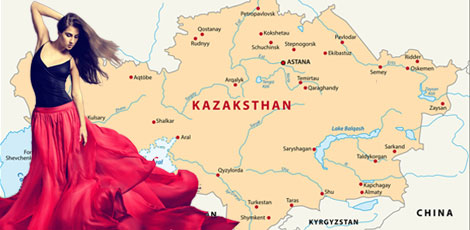The new air cargo frontier
10 / 07 / 2013

EVER SINCE the modern industrial economy was created it has tended to be Europeans and Americans who have been the consumers, while the rest of the world has supplied the raw materials and, more recently in Asia, done the manufacturing too.
But now all over the world new consumer markets are springing up. The growing middle classes in such countries as China and India are well-documented, but as the experience of forwarder ART Logistics is showing, the phenomenon is now spreading to such places as Kazakhstan and Mongolia.
That is opening up new opportunities for airfreight and for logistics companies who can navigate the particular challenges of these markets.
That is opening up new opportunities for airfreight and for logistics companies who can navigate the particular challenges of these markets.
ART was set up in 2005 to ship goods from Europe to Kazahkstan. Its headquarters was initially in Zurich, and in 2009 it opened its first office in the European Union, in Lithuania.
The company then set up a less-than-truckload road service to connect central Europe with Kazakhstan. In 2011 the company added a German office, and launched a rail container service to Central Asia and on to Mongolia.
Evgeniy Reznikov, ART’s business development director, says this has been attracting strong eastbound demand from global forwarders.
The company then set up a less-than-truckload road service to connect central Europe with Kazakhstan. In 2011 the company added a German office, and launched a rail container service to Central Asia and on to Mongolia.
Evgeniy Reznikov, ART’s business development director, says this has been attracting strong eastbound demand from global forwarders.
In 2010 a Hong Kong office opened and, in 2012, that became the forwarder’s headquarters. Reznikov, who is now based there, says there were a number of reasons for this decision, but a key one is that he reckons Hong Kong is now the best centre from which to develop the business, and the best place to attract the talented personnel the company requires.
A major focus of the company is, naturally, project logistics for the oil and gas industry, initially supporting the oil industry in Kazahkstan and Uzbekistan but, since early 2012, coal and other mining activity in Mongolia has been added. The forwarder also brings medical and telecoms shipments into Kazakhstan.
Recently it has also seen a rapid take-off in demand for luxury goods – particularly fashion items – in Kazakhstan. “It is really booming,” says Aliya Mussina, ART’s airfreight general manager, who is based in Almaty, Kazakhstan’s largest city. “This business has doubled in the last five years.”
In particular, premium fashion brands such as Dior, Louis Vuitton, Gucci, Armani and Dolce & Gabbana, are now opening their own stores in Kazakhstan, creating dem-and for a whole new type of logistics.
Previously, Mussina notes, local retailers might have brought fashion items in their own hand luggage or as parcels, but the dedicated stores now require shipments in much larger quantities – maybe 500 items at a time.
Previously, Mussina notes, local retailers might have brought fashion items in their own hand luggage or as parcels, but the dedicated stores now require shipments in much larger quantities – maybe 500 items at a time.
This requires a logistics partner that can handle such consignments within demanding service parameters, and for ART that has meant developing a completely new way of working with local Customs authorities. Mussina says ART and Customs have been ‘learning together’ how to handle such shipments.
She adds: “Though the procedures for hand-ling these shipments already existed, they were never used – and Customs had no experience of them. So we had to work with Customs to develop new ways of working.
Since a small mistake in the Customs declaration can hold up the shipment for a week, we now prepare all the documents in advance. We can now clear shipments in a single day, and offer the customer a guarantee of two days.”
Read Peter Conway’s full Interview in the next edition of Air Cargo News 15 July 2013 – Issue No. 756
She adds: “Though the procedures for hand-ling these shipments already existed, they were never used – and Customs had no experience of them. So we had to work with Customs to develop new ways of working.
Since a small mistake in the Customs declaration can hold up the shipment for a week, we now prepare all the documents in advance. We can now clear shipments in a single day, and offer the customer a guarantee of two days.”
Read Peter Conway’s full Interview in the next edition of Air Cargo News 15 July 2013 – Issue No. 756














